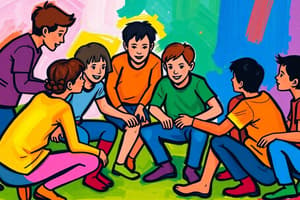Podcast
Questions and Answers
Why do humans cooperate?
Why do humans cooperate?
To improve their wellbeing by increasing access to resources and fostering social bonds.
Give an example of reciprocal altruism.
Give an example of reciprocal altruism.
Neighbors exchanging favors such as borrowing tools or babysitting services.
What is direct reciprocity?
What is direct reciprocity?
Parties directly exchanging benefits based on previous transactions aiming towards fairness.
How does cooperation benefit individuals?
How does cooperation benefit individuals?
Provide a natural example of cooperation.
Provide a natural example of cooperation.
What are some realms that can benefit from cooperation?
What are some realms that can benefit from cooperation?
What is Indirect Reciprocity?
What is Indirect Reciprocity?
Give an example of Competitive Cooperation.
Give an example of Competitive Cooperation.
Explain the Social Exchange Theory.
Explain the Social Exchange Theory.
What are some benefits of cooperation mentioned in the text?
What are some benefits of cooperation mentioned in the text?
How does cooperation contribute to job satisfaction?
How does cooperation contribute to job satisfaction?
What is emphasized as the foundation of societal advancements and personal development?
What is emphasized as the foundation of societal advancements and personal development?
Flashcards are hidden until you start studying
Study Notes
Unlocking Potential through Cooperation
Cooperation is a fundamental social concept that has shaped human societies throughout history. It's the act of individuals working together towards mutual goals, sharing resources and knowledge to achieve success beyond what could have been accomplished individually. This collaborative approach can benefit various realms—from interpersonal relationships to global affairs—and offers numerous advantages when embraced.
Why Cooperate?
Humans cooperate because it helps everyone involved to improve their wellbeing by increasing access to resources and fostering social bonds. By coming together, we create systems like governments and economies that maintain structures allowing our collective progress while empowering individual growth. In nature, cooperation also thrives among species, from honeybees building complex colonies to wolves hunting in packs—a testament to its universal importance across ecosystems.
Forms of Cooperation
There are several types of cooperation, each with distinctive characteristics. They are:
- Reciprocal Altruism: Two parties mutually help one another without fully understanding future interactions, known as tit-for-tat behavior. For example, neighbors exchanging favors such as borrowing tools or babysitting services.
- Direct Reciprocity: Parties directly exchange benefits based on previous transactions, often resulting in repeated interactions aiming toward fairness instead of equality. An example would be employees helping colleagues out today knowing they will likely receive similar support in the future.
- Indirect Reciprocity: One party provides assistance to others based solely on their reputation within the community; this form focuses more on trustworthiness rather than direct repayment after receiving aid. A case study here might be charitable donations made to organizations perceived as reliable in meeting needs.
- Competitive Cooperation: Opposing teams share information and collaboration efforts to boost overall productivity even though they may still compete for limited rewards. Examples range from corporate mergers to international sports events where rivals combine forces to push boundaries in innovation and performance.
- Social Exchange Theory: People engage in cooperation due to exchange values like utility, commitment, love, respect, and other emotions, essentially bartering between partners. For instance, couples who prioritize shared responsibilities, open communication, and trust tend to build stronger relationships over time.
Challenges and Benefits
Drawing upon the strengths of many requires navigating challenges stemming from individual differences, competition, and free riding behaviors. However, by addressing these obstacles, cooperation increases collective intelligence, creativity, and adaptability, leading to better problem solving and decision making processes.
For example, groups conducting joint projects see increased motivation levels, reduced stress, and higher job satisfaction rates compared to those operating independently. Additionally, society gains immense benefits such as enhanced economic prosperity, improved safety measures, and healthier environments.
In conclusion, cooperation forms the foundation of societal advancements and personal development, enriching lives and communities alike. Though fostering harmony amidst diversity comes with unique challenges, the potential for positive change remains limitless when people choose unity over division.
Studying That Suits You
Use AI to generate personalized quizzes and flashcards to suit your learning preferences.





